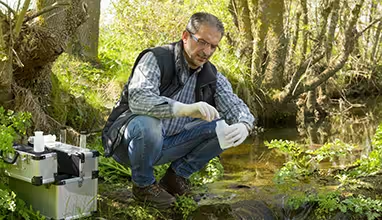The work of a hydrologist may seem simple, but it actually involves an in-depth knowledge of several scientific processes. As a result, a Master’s degree is typically the minimum amount of hydrologist education required in order to work in this career field.
Getting Ready in High School
While in high school, those who wish to become hydrologists can prepare themselves by taking as many science courses with laboratories as possible. If these courses are offered at the advanced placement level, this could be an added bonus. Advanced math courses such as calculus and trigonometry can also be helpful since hydrologists often need to make precise calculations. Joining a science or nature club can also provide one with practical experience that could be useful later.
Earning a Bachelor’s in Hydrology
Before going on to obtain a Master’s degree, students will first need to complete a Bachelor’s in hydrology or natural sciences. Some of the courses that could be taken while earning this degree include water circulation and distribution, water pollution and water systems maintenance. Special emphasis could be placed on the different water systems used for industrial, agricultural and residential use. It can cost between $7,400 and $18,260 for tuition. Room and board can be between $8,000 and $12,000 annually, books can run another $600 to $1,500 and fees can rack up an additional $200 to $600.
Graduate Degree – Hydrology Masters
While working towards a Master’s degree, students will be able to specialize in areas such as surface water, watersheds and water resource evaluation. Some of the classes required in order to earn this graduate degree include hydrogeology, aqueous geochemistry, contaminant transport and water resources engineering. It can take between two and four years to earn this degree at a cost of around $7,500 to $18,420 per year. This does not include books, fees, or room and board, which can all add up to another $9,400 to $21,200 annually.
Doctorate in Hydrology
A PhD is sometimes sought by those who wish to teach hydrology or perform research. While studying for a doctorate degree, a great deal of time can be spent performing field research. Students must typically complete a dissertation, which includes defending the findings of their research. Some classes that are usually required include contaminant transport and water resource management in developing regions. It can take between two and five years to earn this doctorate and cost between $21,400 and $67,000 annually for tuition and fees. Books can run an additional $1,500 to $2,420 per year.
Certification
The American Institute of Hydrology provides certification for hydrologists. Before becoming certified, individuals must generally have at least one year of practical experience in the field. There are also different levels based upon the number of years one has worked as a hydrologist. Each license requires a $50 application fee and $200 exam fee. In order to keep a license current, annual dues of $90 must also be paid.
Hydrologist training is intense and highly technical. Even after working in this industry for some time, these scientists are bound to discover there are always new things to learn making continuing education essential.






